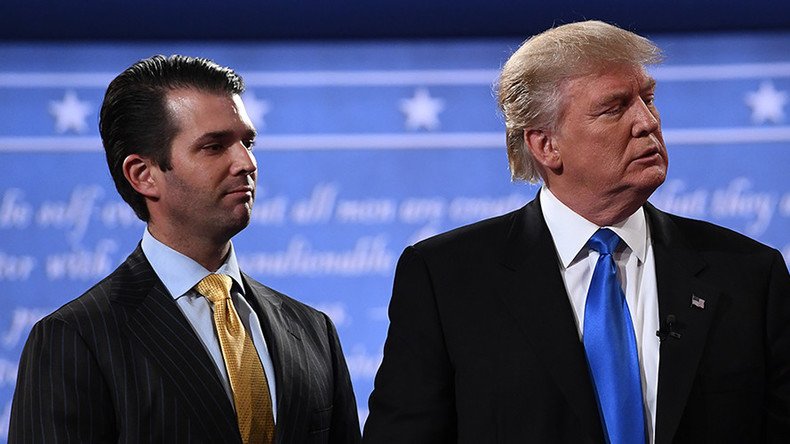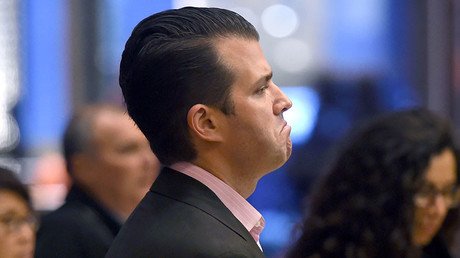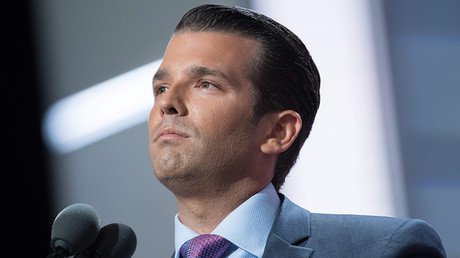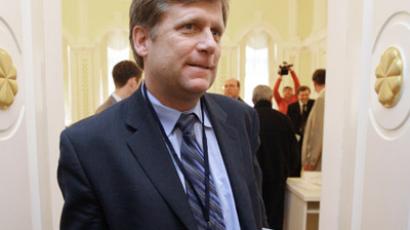Trump-Russia dominates headlines, but there’s more evidence of collusion between Democrats & Ukraine

Ukrainian cooperation with the Democratic Party appears to have been far deeper than any equivalent Trump-Russia collusion. Both pale in comparison to Washington's meddling in the former USSR. But the US media focuses on the most illusory of the situations.
It’s pretty obvious Donald Trump Jr. isn’t the brightest light in the firmament. The lethargic, spoiled and languid persona he projects doesn’t help either. Nevertheless, the current hysteria surrounding his meeting a small-time Russian lawyer is beyond any bounds of reason.
Especially coming from journalists who have surely met a dodgy source or two in their time, in the hope of a scoop.
Natalia Veselnitskaya was almost certainly not representing the Kremlin when she courted baby Trump. Rather she was lobbying on behalf of a client, mixed up in the Sergei Magnitsky case. To that end, the ex-UK tabloid hack Robert Goldstone exaggerated her usefulness to attract Donald Jr.’s attention. By Trump's own account, he quickly sussed this distorted pretext and pulled back. Plus, it’s worth mentioning how she’s also engaged plenty of Democrats as part of her campaign.
Nevertheless, certain media elements have been guilty of greater inflation than Veselnitskaya. Including the New York Times, which laughably labeled her a “fearsome Moscow insider,” without explaining how it was Moscow Oblast, not Moscow city, where she enjoyed this clout. Because despite the shared name, the region and the metropolis are two different entities, roughly analogous to the relationship between Virginia and Washington DC. Thus, the Times’ misleading headline was much the same as a Russian outlet hailing a Richmond-based attorney as some kind of White House specialist.
There is another thing which makes this endless Trump-Russia delirium even more dubious. And that’s how the US establishment will leap on any connection, no matter how vague, concerning the President’s team and Russians, but ignores dealings between the Democratic Party and Ukraine. The elephant in the room which has been almost completely ignored, and was amazingly not even mentioned when Petro Poroshenko visited Washington last month.
The real world
Let’s be clear, Ukraine feared a Trump presidency. Because, on the campaign trail, the candidate had openly suggested recognizing Russia’s reabsorption of Crimea and spoke of the Donbass crisis as a problem for Europe, not America. As a result, Kiev bet the house on Hillary Clinton. And lost.
As Politico reported in January: “Ukrainian government officials tried to help Hillary Clinton and undermine Trump by publicly questioning his fitness for office. They also disseminated documents implicating a top Trump aide in corruption and suggested they were investigating the matter, only to back away after the election. And they helped Clinton’s allies research damaging information on Trump and his advisers.”
Now, this is pretty explosive stuff. A credible American news organization is reporting how a foreign government directly interfered in the US election. But the popular press didn’t pursue the story. Presumably, because its runs counter to the established narrative.
“A Ukrainian-American operative who was consulting for the Democratic National Committee met with top officials at the Ukrainian Embassy in Washington in an effort to expose ties between Trump, top campaign aide Paul Manafort, and Russia, according to people with direct knowledge of the situation,” the piece continued. “The Ukrainian efforts had an impact in the race, helping to force Manafort’s resignation and advancing the narrative that Trump’s campaign was deeply connected to Ukraine’s foe to the east, Russia.”
And here was the zinger: “Politico’s investigation found evidence of Ukrainian government involvement in the race that appears to strain diplomatic protocol dictating that governments refrain from engaging in one another’s elections.”
Later, Politico focused on the activities of Alexandra Chalupa, a Ukrainian-American activist, who admitted acting as a link between Ukraine’s Washington Embassy and the Democratic National Committee. And also how Sergei Leshchenko, elected in 2014 as an MP for Poroshenko’s party, had offered ledgers purportedly showing connections between Trump and Manafort before urging “Ukrainian and American law enforcement to aggressively investigate Manafort.” Incidentally, Manafort has always been especially appalled at attempts to link his work to Russia, saying “all my efforts were focused on helping Ukraine move into Europe and the West.”
A Tale of Two Intentions
Leschenko wasn’t coy about his intentions. He openly admitted trying to expose Trump as a “pro-Russian candidate who can break the geopolitical balance in the world,” by preferring Moscow to Ukraine. Furthermore, as The Atlantic noted: “the investigation into the payments listed in the ledger—which in April were partially corroborated by the AP through wire transfers that Manafort claimed were legitimate—mysteriously faded after the U.S. election, raising questions about whether Ukrainian officials aired concerns about Manafort less to root out corruption than to undermine the Trump campaign.”
Overall, Democrat-Ukraine collusion seems far deeper than anything so far proven between the Trump campaign and Russia. For instance, Donald Jr. stands exposed as having been willing to meet someone described as affiliated with the Kremlin to get information on Hillary, which was pretty dumb. The meeting itself appeared to be a bait and switch so the lawyer could lobby on other matters.
However, the Ukraine story involved a concerted and deliberate campaign, including cooperation between Kiev representatives and the Clinton camp to research Trump-Kremlin connections. Thus, If the issue is collusion, it’s obvious there was much greater connivance concerning Ukraine and the Democrats than a single exchange involving Donald Jr. and an insignificant lawyer. One where no information was actually provided.
That said, American outrage over meddling from Kiev and Moscow is laughable in the context of Washington’s long history of interference in both countries’ politics. In 1996, the US openly intervened in Russia’s election to help Boris Yeltsin defeat the Communist Gennady Zyuganov. And in 2011, Washington officials, including Clinton, publicly supported a protest campaign over disputed parliamentary elections. The following year, Michael McFaul arrived as ambassador to Moscow and unabashedly courted fringe opposition leaders in his very first event in the role.
In Ukraine, the interruptions have had even more serious consequences. By the admission of Victoria Nuland, a member of the Obama administration, Washington spent over $5 billion on influence projects in the country. The first “regime change” operation came in 2004 and was known as the “Orange Revolution.” And in 2013, US politicians and officials, such as John McCain and Nuland herself, turned up in Kiev to encourage the Maidan movement, in which the US ambassador Geoffrey Pyatt was prominent.
That led to the violent overthrow of a democratically elected government, which divided the country and caused the separation of Crimea and a civil war in the Donetsk and Lugansk regions. And it also contributed to an economic collapse which has seen the average Ukrainian salary fall to around $200 a month and led to unprecedented levels of emigration.
For sure, Ukrainians didn't hide their hostility to Trump. Interior Minister Arsen Avakov deriding the eventual winner as a “dangerous marginal” and describing him as a “clown” on Twitter. Many Russians publicly slammed Clinton, which was hardly surprising after she compared Vladimir Putin to Hitler.
The fact remains there is no evidence of a direct Kremlin campaign to undermine America’s election. The media has almost totally ignored Kiev’s transparent meddling to chase Russian ghosts. All the while downplaying US manipulation of the political process throughout the former Soviet Union.
The statements, views and opinions expressed in this column are solely those of the author and do not necessarily represent those of RT.
















